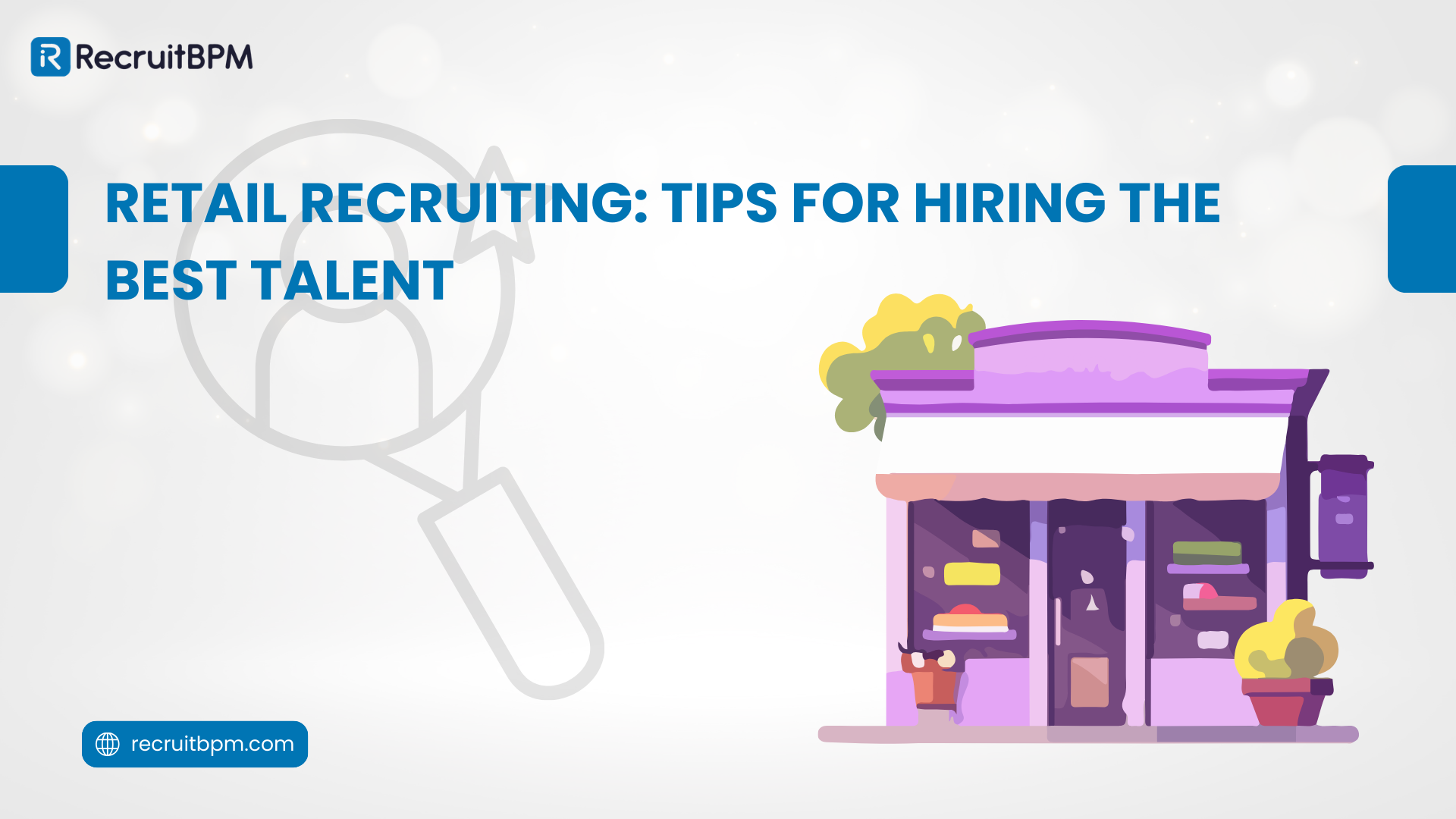Retail recruiting challenges staffing agencies with a 60% annual turnover rate for frontline workers. High-volume hiring demands, seasonal peaks, and fierce local talent competition create constant pressure.
Your staffing agency needs smarter retail recruitment approaches. Traditional methods fail in this fast-paced environment. You need strategies that attract quality candidates while reducing time-to-hire.
This guide reveals proven retail recruiting strategies. You’ll discover how to overcome common challenges and build strong candidate pipelines.
What is Retail Recruiting?
Retail recruiting is finding and hiring talent for retail positions. This includes sales associates, store managers, warehouse staff, and corporate roles. The goal is to identify candidates with customer service skills and cultural fit.
Your agency handles the complete hiring lifecycle. You source candidates, screen applications, conduct interviews, and manage onboarding. Each step requires precision and speed.
The retail sector demands volume hiring capabilities. You might fill 10 positions or 500. Scalability separates successful agencies from struggling ones.
Retail encompasses diverse segments requiring different skills. Luxury boutiques need style-savvy associates with premium service skills. Tech retailers want product-knowledgeable staff. Matching skills to specific retail environments drives placement success.
Why is Retail Recruiting Important?
Retail directly employs 32 million workers in the United States. This creates enormous opportunities for staffing agencies. The sector’s constant hiring needs generate recurring revenue streams.
Employee quality directly impacts retail business success. Great hires improve customer satisfaction and boost sales. Poor hires damage customer experiences and hurt profitability.
Research shows 80% of customers make purchase decisions based on service quality. Your placed candidates influence these interactions daily. High turnover drains retail profitability through constant recruiting costs.
Seasonal peaks amplify hiring importance. Holiday shopping and summer tourism create urgent staffing needs. Your ability to deliver qualified candidates during these windows determines client satisfaction.
Retail Recruiting Challenges
Understanding retail recruiting obstacles helps you develop better solutions. These challenges create opportunities for agencies with the right tools and strategies.
High Turnover Rates
Retail experiences 60% annual turnover for frontline workers and 63% for store managers. This revolving door creates endless hiring cycles.
Low wages, limited advancement, and demanding conditions discourage long-term commitment. Many workers view retail as temporary. Unpredictable schedules compound the problem.
Exit interview data reveals valuable retention insights. Track why candidates leave placements. Use this intelligence to improve candidate matching and set realistic expectations.
Seasonal Hiring Demands
Retail businesses face dramatic staffing fluctuations. Retailers added 561,800 jobs during the 2024 holidays alone. These peaks create intense recruiting pressure.
Getting staffing levels right proves challenging. Overstaffing increases costs. Understaffing leads to poor service and lost sales.
Building year-round talent pipelines solves this challenge. Maintain relationships with previous seasonal hires. They often return when engaged properly.
Volume Hiring Complexity
High-volume retail hiring strains conventional methods. Processing thousands of applications manually overwhelms teams. Popular positions attract hundreds of responses.
Store managers often lack recruitment training. Promoted from frontline roles, they rely on instinct. Decentralized hiring across locations adds complexity.
Technology Limitations
Many agencies use outdated recruitment technology. Point solutions create disconnected workflows and fragmented data. Limited automation forces manual administrative work.
Lack of mobile-friendly applications loses candidates. Insufficient analytics blind agencies to performance metrics. Real-time dashboards drive better decisions.
Candidate Quality and Availability
Finding qualified retail candidates grows harder. Competition for local talent intensifies during peaks. Skills mismatches create frustration and training costs.
Candidate ghosting disrupts timelines. Applicants schedule interviews, then never appear. This unprofessionalism wastes resources.
Retail Recruiting Strategies
Waiting until positions open creates unnecessary pressure. Proactive pipeline development ensures candidate readiness when needs arise.
Start sourcing candidates before hiring demands emerge. Engage potential workers through industry content, virtual hiring events, and ongoing relationship-building. Create segmented pools for seasonal workers, high performers, and specialized roles.
Leverage AI-powered ATS platforms to surface candidates quickly. Modern systems identify qualified applicants from existing databases instantly. This reduces dependency on last-minute sourcing during crunch periods.
Maintain relationships with past placements and near-hires. These pre-screened candidates deploy immediately when opportunities match. Regular engagement through newsletters and touchpoints keeps them warm.
Your talent pool becomes a strategic asset. The larger and more engaged your pipeline, the faster you fill positions. This speed creates client satisfaction and strengthens retention.
Optimize Job Descriptions
Job descriptions serve as your first marketing touchpoint with candidates. Poorly written descriptions attract wrong-fit applicants or discourage qualified ones.
Balance accessibility with clear requirements. List only essential qualifications needed for success. Avoid laundry lists that eliminate otherwise capable candidates.
Use active language that engages readers. Replace passive corporate-speak with dynamic descriptions. Paint pictures of what working feels like for your client.
Include realistic salary ranges and benefits information. Transparency attracts serious candidates and reduces time wasted on mismatched expectations. Competitive compensation messaging differentiates you from competitors.
Align requirements with actual position needs. A luxury boutique requires different skills than discount retail. Customize descriptions for each client’s unique environment and culture.
Leverage Social Media Recruiting
Social media platforms offer powerful retail recruiting channels. Your target candidates spend significant time on these networks daily.
LinkedIn works well for management and corporate retail positions. Share job openings, company culture content, and industry insights. Engage with potential candidates through relevant discussions and thought leadership.
Facebook enables demographic targeting for hourly positions. Create campaigns reaching specific age ranges, locations, and interests. Local community groups yield strong candidates for nearby retail locations.
Instagram showcases the client workplace culture visually. Behind-the-scenes content, employee spotlights, and day-in-the-life stories attract candidates. Visual storytelling resonates especially well with younger retail workers.
Encourage current placements to share opportunities on personal accounts. Employee networks contain similar-quality candidates. Referrals from trusted sources convert at much higher rates.
Implement Employee Referral Programs
Employee referrals generate higher-quality retail hires than most other sources. Referred candidates understand job realities better and fit company cultures more naturally.
Create structured referral incentive programs. Offer bonuses when referred candidates complete probationary periods. Even modest rewards drive significant participation.
Make referral processes simple and mobile-friendly. Complicated submission requirements discourage participation. Mobile-accessible referral portals increase engagement dramatically.
Communicate program details clearly and frequently. Employees can’t refer if they don’t know positions exist. Regular updates about open roles and incentives maintain awareness.
Track referral source quality over time. Some employees consistently refer excellent candidates. Recognize and reward these top referrers to encourage continued participation.
Embrace Recruitment Automation
Automation transforms retail recruiting efficiency. Implement applicant tracking systems that automate screening. Use AI-powered chatbots for initial candidate engagement.
Automate interview scheduling to eliminate coordination hassles. Deploy automated reference checking platforms.
Prioritize Candidate Experience
Candidate experience impacts hire quality and acceptance rates. Streamline application processes for mobile users. Communicate clearly throughout the hiring stages.
Provide constructive feedback to unsuccessful candidates. Create engaging interviews that showcase client culture.
Offer Competitive Compensation Packages
Conduct regular market research on retail compensation. Highlight total compensation beyond base wages. Consider performance-based incentives.
Promote advancement opportunities and wage growth paths. Clear progression keeps workers longer.
Focus on Diversity and Inclusion
Remove bias from job descriptions. Use structured interview processes with standardized questions. Partner with diversity-focused organizations.
Train hiring managers on inclusive practices.
Develop Store Manager Recruiting Skills
Provide structured interview training. Create standardized evaluation criteria. Offer ongoing support and coaching.
Supply managers with user-friendly recruiting technology.
Measure and Optimize Performance
Monitor time-to-hire across positions and sources. Calculate quality-of-hire using retention data. Analyze candidate drop-off points.
Compare metrics against industry benchmarks.
How RecruitBPM Solves Retail Recruiting Challenges?
Retail recruiting demands specialized solutions that traditional platforms can’t provide. RecruitBPM offers unified ATS and CRM functionality designed specifically for staffing agencies.
Unified Platform for Volume Hiring
RecruitBPM combines applicant tracking and relationship management in one system. You track candidates from sourcing through placement without switching platforms. This eliminates data silos that slow retail recruiting.
The system scales effortlessly from 10 placements to 10,000. Whether you’re staffing a single boutique or a national retail chain, workflows remain consistent. Add unlimited clients and candidates without performance degradation.
Customizable workflows adapt to each retail client’s unique process. Configure approval chains, screening criteria, and communication templates. Every client gets tailored service without operational complexity.
Bulk actions handle high-volume scenarios efficiently. Update hundreds of candidate records simultaneously. Send mass communications to segmented groups. These capabilities save hours during peak hiring periods.
AI-Powered Automation
RecruitBPM’s AI features eliminate manual retail recruiting tasks. Resume parsing extracts key information automatically. Intelligent matching connects candidates with ideal positions.
Automated workflows move candidates through hiring stages based on triggers. When applications arrive, screening emails deploy automatically. Interview scheduling happens without the coordinator’s involvement.
Smart chatbots engage candidates 24/7 with instant responses. They answer FAQs, prescreen qualifications, and schedule initial conversations. This responsiveness prevents candidate loss to faster competitors.
Predictive analytics forecasts hiring needs before they become urgent. Historical data reveals seasonal patterns and growth trends. Proactive sourcing begins before requisitions arrive.
Mobile-First Candidate Experience
RecruitBPM prioritizes mobile usability for retail candidates. One-tap applications from smartphones capture quality applicants. Complex desktop-only processes lose these workers to competitors.
Mobile-optimized career portals showcase client opportunities attractively. Candidates browse positions, submit applications, and track status from any device. This convenience improves completion rates significantly.
Text messaging integration enables preferred communication channels. Candidates respond faster to texts than emails. Automated SMS reminders reduce interview no-shows.
Video interview capabilities work seamlessly on mobile devices. Candidates record responses or join live sessions from their phones. This flexibility accommodates retail workers’ unpredictable schedules.
Comprehensive Integration Ecosystem
RecruitBPM connects with 5,000+ job boards and sourcing platforms. Post to Indeed, ZipRecruiter, and niche retail job sites simultaneously. This broad reach fills pipelines quickly.
Social media integrations streamline LinkedIn, Facebook, and Instagram recruiting. Share opportunities across networks with a single click. Track which platforms generate the best candidates.
Background check, assessment, and onboarding tool integrations create seamless workflows. Candidate data flows between systems automatically. No manual data entry or platform switching required.
Calendar synchronization with Outlook, Google, and other platforms simplifies scheduling. Interviewers see real availability across all tools. Double-booking and scheduling conflicts disappear.
Real-Time Analytics and Reporting
RecruitBPM dashboards provide instant visibility into recruiting performance. Track time-to-hire, source effectiveness, and quality-of-hire in real-time. Make data-driven decisions without waiting for reports.
Customizable reports answer specific client questions quickly. Demonstrate your value with placement statistics, diversity metrics, and retention data. Visual charts communicate results clearly.
Predictive analytics identifies bottlenecks before they impact hiring. When screening times increase or candidate drop-offs spike, you know immediately. Proactive corrections prevent missed deadlines.
ROI calculations prove your recruiting efficiency improvements. Show clients exactly how your processes reduce their hiring costs. Quantified value strengthens relationships and justifies fees.
Transparent Pricing for Scalability
RecruitBPM costs $89 per user monthly with no hidden fees. Staffing agencies know exactly what they’ll pay regardless of growth. Transparent pricing enables confident planning.
This affordability makes sophisticated recruiting technology accessible to agencies of all sizes. Small firms access enterprise-level capabilities without enterprise budgets. Level the playing field against larger competitors.
No per-placement fees or transaction charges eat into profits. Your costs remain predictable even during high-volume periods. Scale operations without scaling expenses proportionally.
The platform grows with your agency. Start with a few users and add more as needed. No complicated pricing tiers or feature limitations.
Conclusion
Retail recruiting presents unique challenges that demand specialized solutions. High turnover, seasonal demands, and volume hiring require strategies beyond traditional approaches.
Your staffing agency must build continuous talent pipelines rather than reactive sourcing. Optimize job descriptions for mobile-first candidates. Leverage automation to handle repetitive tasks efficiently.
Focus on candidate experience throughout your hiring process. Speed, transparency, and responsiveness win quality candidates. Poor experiences lose them to more attentive competitors.
Technology transforms retail recruiting effectiveness when chosen correctly. Unified ATS and CRM platforms eliminate the fragmentation plaguing point solutions. Real-time analytics drive better decisions.
RecruitBPM provides the comprehensive platform retail-focused staffing agencies need. Combine applicant tracking, relationship management, automation, and analytics in one system. Scale confidently from boutique clients to national retail chains.
The retail sector’s constant hiring needs create unlimited opportunities. Agencies mastering these recruiting strategies and leveraging proper technology will dominate their markets.
Book a demo to see how RecruitBPM revolutionizes retail recruiting for staffing agencies like yours.
Frequently Asked Questions
How can I reduce high turnover rates in retail placements?
Focus on better candidate matching from the start. Conduct a thorough screening that evaluates cultural fit alongside skills. Set realistic job expectations during interviews. Poor matches create quick departures.
Encourage clients to invest in employee development and advancement paths. Retail workers stay longer when they see career progression possibilities. Training programs and promotion opportunities improve retention significantly.
Use RecruitBPM’s analytics to identify which sourcing channels produce the longest-tenured placements. Double down on high-retention sources. Abandon channels consistently producing quick turnover.
Maintain post-placement contact with your candidates. Check-ins during the first 90 days reveal issues early. Addressing concerns proactively prevents preventable departures.
What technology features matter most for retail recruiting?
Mobile optimization ranks highest in importance. Retail candidates apply from smartphones predominantly. Platforms requiring desktop access lose quality applicants to mobile-friendly competitors.
Automation capabilities determine volume hiring success. Resume parsing, automated screening, and workflow triggers handle high application volumes. Manual processes collapse under retail’s demands.
Integration ecosystems expand your sourcing reach efficiently. Systems connecting with multiple job boards and social platforms fill pipelines faster. Disconnected tools waste time on duplicate data entry.
Real-time analytics enable data-driven optimization. Track metrics instantly rather than waiting for monthly reports. Identify and fix bottlenecks before they impact client satisfaction.
How do I build year-round talent pipelines for seasonal retail hiring?
Start seasonal recruiting earlier each year. Begin sourcing summer workers in early spring. Holiday season hiring should commence by late summer.
Create talent pools from previous seasonal workers. Track performance data and rehire top performers annually. These proven candidates require minimal training and start productively immediately.
Maintain engagement with seasonal candidates between peak periods. Share industry news, company updates, and career resources. Regular touchpoints keep your agency top-of-mind when they’re ready to return.
Partner with schools and temporary agencies for supplemental seasonal capacity. Universities provide students with holiday work. Staffing agencies offer pre-screened candidates deployable quickly.
What makes retail recruiting different from other industries?
Volume requirements dwarf most sectors. Retail clients need 10, 50, or 500 placements simultaneously. Systems that work for filling five engineering positions fail catastrophically with this scale.
Speed expectations compress timelines dramatically. Corporate hiring might allow four weeks. Retail clients often need candidates within days. Your processes must accommodate rapid turnarounds.
Turnover rates create constant recruiting cycles. Unlike industries where placements last years, retail requires ongoing sourcing. You’re always recruiting for the same clients.
Decentralized hiring across multiple locations adds complexity. Each store manager might hire independently using different criteria. Maintaining consistency requires robust systems and training.
How important is candidate experience in retail recruiting?
Candidate experience directly impacts acceptance rates and referrals. Poor experiences lose candidates to competitors offering better treatment. Today’s tight labor market gives candidates a choice.
Research shows 80% of candidates share negative experiences online or with friends. Bad experiences damage your employer brand and reduce future applicant flow. One poor interaction creates lasting reputation harm.
Mobile-friendly applications and quick response times define modern expectations. Candidates applying from smartphones expect simple processes. Delays in communication drive them toward more responsive agencies.
Positive experiences generate referrals from candidates even when not hired. Respectful treatment and helpful feedback encourage them to recommend your agency. These organic referrals cost nothing and convert well.

















